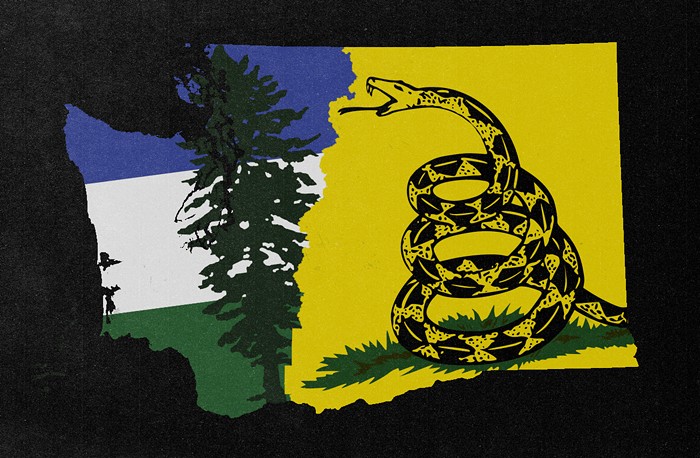
The few people who noticed and mentioned that Donald Trump had a chance of winning the presidency in 2016 all remember the condescending sneers of expert political analysts in their homes and offices who said things like "don't be ridiculous" and "it could never happen" and "you're just being duped by social media."
Well, it's never too early (alas) to start thinking about 2020, and unless something dramatic happens on the supposedly human side of the aisle soon, there's good reason to believe the conditions that lead to Trump's victory will continue to prevail and gain him a second term as President of the United States.
Alarmist? Of course it is. But alarms are appropriate when things are on fire.
Thomas Frank, formerly of The Baffler, and author of the books What's the Matter with Kansas?, Pity the Billionaire, and One Market Under God, to name a few, moots an eerily plausible hypothetical scenario for Trump's re-election in the new issue of Harper's. The argument rests on the possibility that the low unemployment rate will continue, leading to consumer confidence, a strong stock market, and wage increases.
The fact that the market has been tanking of late does seem like a potential hitch, but stocks fluctuate. The larger reality that Frank imagines involves Trump benefitting directly from social conditions he had nothing to do with engendering—e.g. the long, slow climb out of GW Bush's financial crisis engineered by the Obama administration—and from the general disrepair of the democratic party.
"Before you close this magazine, chuckle cynically, and take a sip of gin," Frank writes, "think for a second about the cultural and political delusions a roaring economy and rising wages would surely generate — just as the tech mania of the late Nineties did, and just as the bull market of the Eighties did. Perhaps Donald Trump, elevated to the presidency in 2016 as an act of protest by what he called the 'forgotten men and women of our country,' will actually appear to come through for them. Like Bill Clinton with his laserlike economic focus, Trump will seem to have delivered on what he promised: an economy that finally looks good for his supporters. For once, they will conclude, politics worked.
Cue the victory flotilla in New York Harbor. Cue the hundred-year night."
Later in the piece, he gets real about the opposition, observing, with understatement, that "the Democratic Party we have today is not particularly well suited to the essential task of beating Donald Trump":
It is true that the Democrats’ fighting instincts have been aroused by the ascendancy of Trump, and this is a healthy thing. Fewer and fewer American liberals worship at the shrine of bipartisanship, as they have done for most of the past few decades. Instead, they are outraged. They are horrified at what has happened. Descriptions of Republican misgovernance that were formerly considered extreme are now taken for granted.2 That a quality person like Hillary Clinton, who prepared to be president all her life, should be bested by this vulgar, racist ignoramus — it is unthinkable. It is unacceptable.
I understand this reaction. I have felt it myself. But it has led the Democrats into a trap familiar to anyone with experience of left-wing politics: the party’s own high regard for itself has come to eclipse every other concern. Among the authorized opinion leaders of liberalism, for example, the task of deploring and denouncing the would-be dictator has crowded out the equally important task of assessing where the Democratic Party went wrong. Indeed, the two projects appear to them to be contradictory — they find it impossible to flagellate Trump one day and examine themselves the next. Of the two, it is introspection that must hit the bricks. And it is uncompromising moral stridor that has come to dominate the opinion pages and the airwaves of the enlightened — a continuous outpouring of agony and aghastitude at Trump and his works.
This is unfortunate, because what happened in 2016 deserves to be taken seriously. This country of 320 million people was swept by a tidal wave of populist rage. Alongside the ugly eruption of bigotry there swirled perfectly natural concerns about deindustrialization, oligarchy, the power of big banks, bad trade deals, and the long-term abandonment of working-class concerns by the Democrats. I am condensing many strands here, of course, but what is important is that for all its awfulness, there were elements of the 2016 revolt that liberals ought to heed.
But most leading Democrats can’t seem to see any of that. They don’t know what to make of Trump and his supporters, so violently does Trumpism transgress the professional norms to which they are accustomed. It is distasteful to them that they should be required to learn anything from a clown like the current president — that they should have to change in any way to accommodate his preposterous views. And so they cast about for leaders who might allow them to prevail without doing anything differently: a celebrity who might communicate better, a politician who might turn out the base more effectively. They devour articles about Trump voters who have had a change of heart and now beg forgiveness for their sins. They chide other liberals whom they regard as insufficiently enthusiastic about the Democratic Party. Above all, they dream of a deus ex machina, a super-prosecutor who will bring down justice like fire and reverse the unfortunate results of 2016 without anyone having to change their talking points in the slightest.
I only wish I could just cut and paste the whole thing, but that would run us into copyright difficulties. Fortunately, you can just go read the whole thing yourself, and maybe buy a copy of Harper's next time you're at the grocery store.
Frank is exactly right when he surmises that this culture is not built for meaningful reflection, especially when it comes to considering one's own culpability for a defeat. The let's-call-it-the-left is far more hospitable to what political operative Bill Curry calls "an alternative to political victory: a utopia of scolding."
But surely we must be at least starting to realize that indignation and "moral stridor" (sent me to the dictionary, too) are insufficient rejoinders to the phenomenon of Trumpism—largely because not being as bad as the worst person ever is not the same thing as being good enough.
Surely we're approaching the point where we understand that it's impossible to further "normalize" (or, for that matter, to de-"normalize") the person who holds the most fully institutionalized office in the country. Pretending he's not the president won't make him not be the president. It may, in fact, help ensure that he remains the president.
Surely we must be on the verge of understanding that refusing to get real about self-critique within the larger critique is a recipe for disaster. Even if Trump loses or doesn't run in 2020, the Trump daemon will reappear before long. Comparative sanctimony feels better than prostration and surrender, but it's a poor campaign strategy.
And surely we can agree that a truly honest, useful, and humane anti-oligarchic populist political movement should both come from and list toward the left. It's dispiriting to consider that it has been over 100 years since such a movement was so desperately called for in America, and has never seemed further from emerging—thanks to republicans and democrats alike.
PS
"Stridor: noun. 1. a harsh, grating, or creaking sound. 2. Pathology. a harsh respiratory sound due to any of various forms of obstruction of the breathing passages."
PPS
"Aghastitude"!














